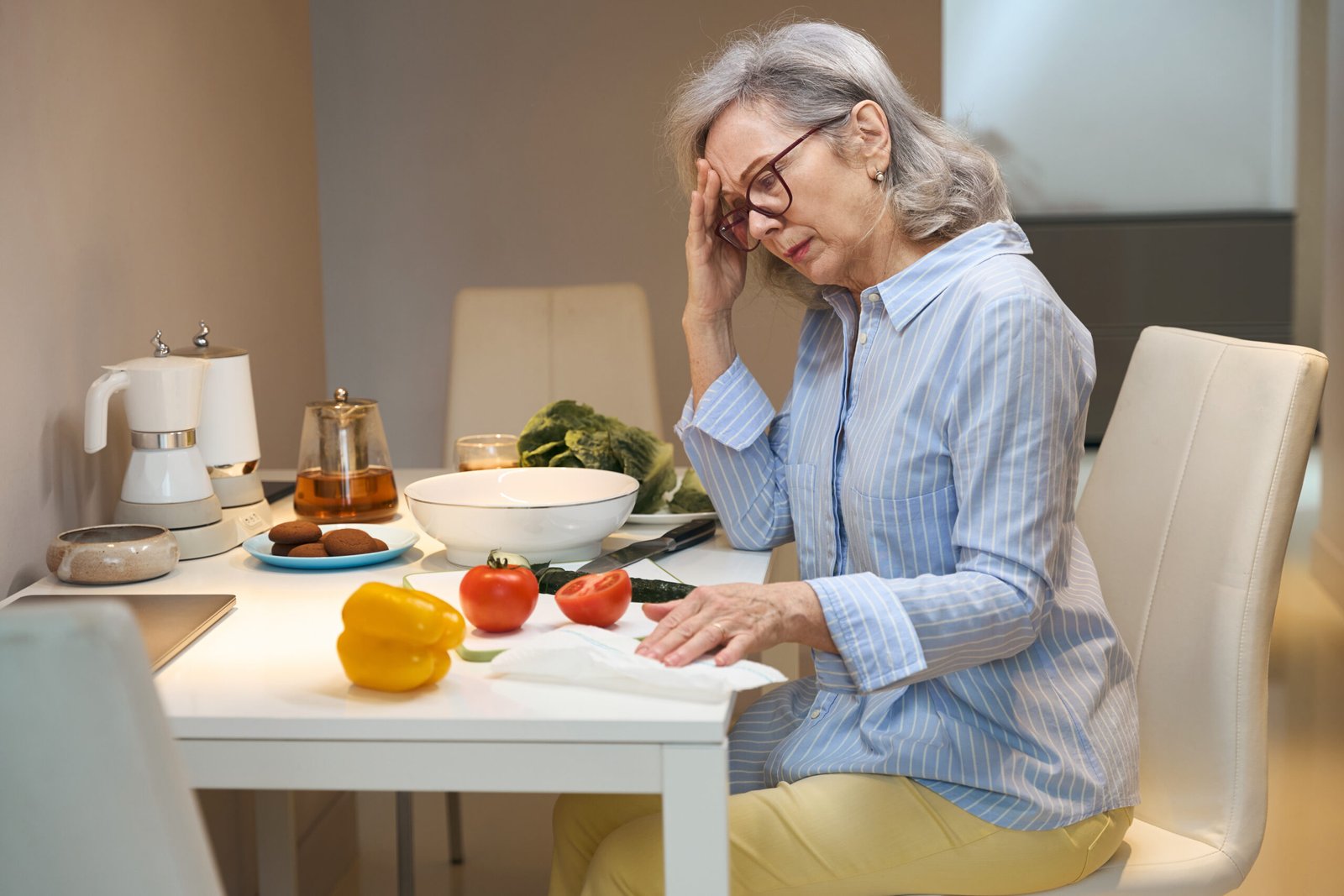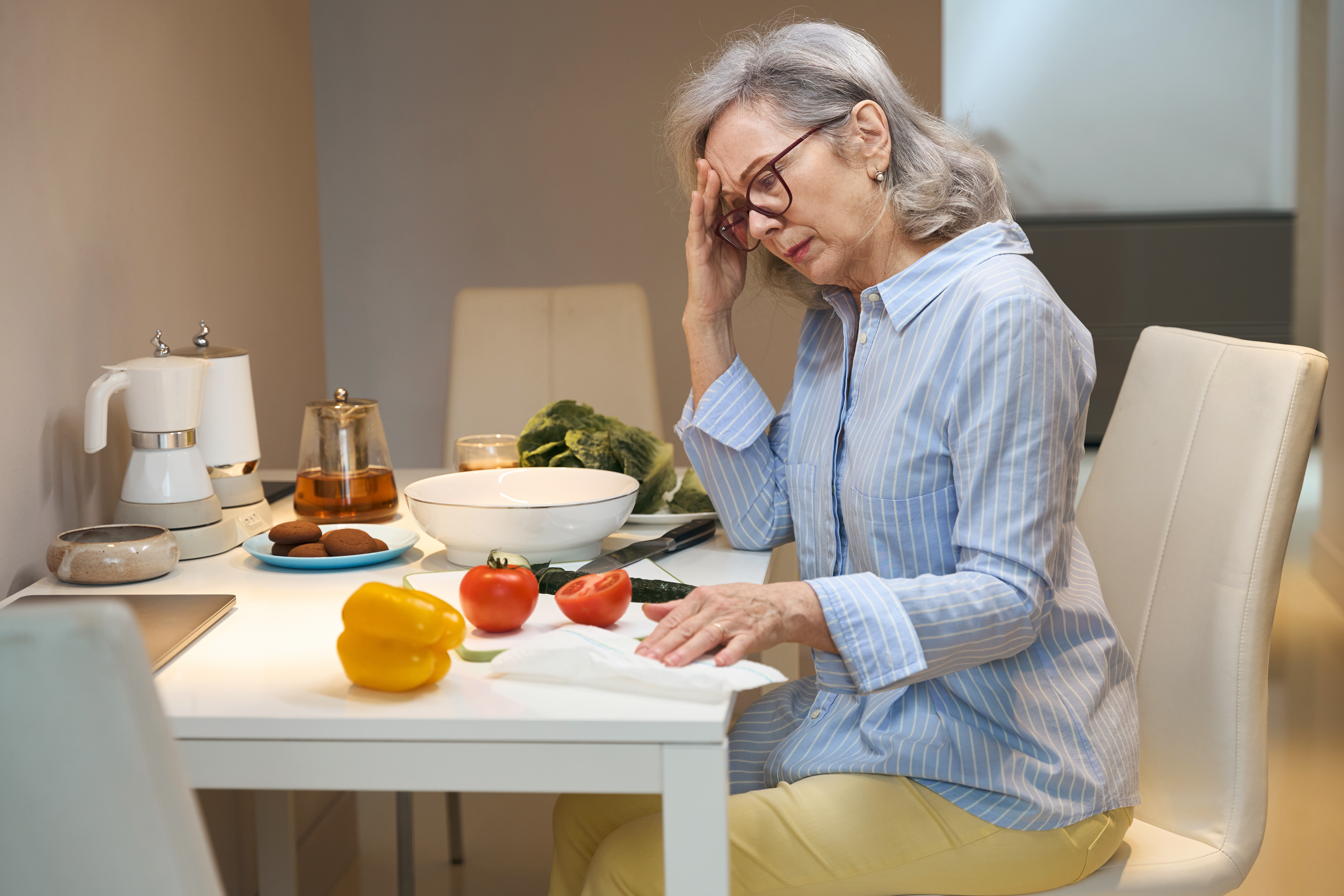
Sad gray-haired lady in casual clothes sits at the kitchen table, vegetables for salad in front of her
Beyond Diets: Discovering Emotional Freedom for Lasting Change
You’re not alone in feeling trapped by emotional eating. Traditional diets often miss the mark, leaving you frustrated and still seeking answers. Imagine a path where healing and self-love replace guilt and restriction. VK Circle offers just that—a nurturing approach to emotional freedom. Here, you’ll find the tools and support to break free from binge cycles and embrace true self-worth. Ready to explore a compassionate alternative that truly understands your journey? Learn more about how VK Circle’s 90-day Emotional Freedom Program can change your life today.## Why Diets Fail Emotional Eaters

Understanding why traditional diets don’t work for emotional eaters is crucial. Emotional eating is a complex issue that diets often overlook. It involves eating in response to feelings rather than hunger, making it tough to rely solely on willpower or calorie counting. These methods fail to address the emotional triggers that lead to binge eating and diet failure.
Overcoming Diet Failure
Diet failure is common among emotional eaters, as traditional diets don’t tackle the root causes. Emotional eating often stems from stress, anxiety, or other emotional challenges. When these emotions arise, food becomes a temporary comfort. Diets that focus strictly on food intake miss this emotional aspect.
To overcome diet failure, it’s essential to identify emotional triggers. Reflect on situations that prompt emotional eating. Is it stress at work or personal life challenges? Once you identify these triggers, you can work on healthier coping mechanisms.
Another critical step is to develop a healthier relationship with food. This involves shifting focus from food restriction to nourishment and self-compassion. Encouraging self-love can lead to more sustainable changes in eating habits. 🌿
Emotional Eating Explained
Emotional eating is when individuals eat in response to emotions rather than hunger. It often involves consuming large quantities of comfort or junk foods. This behavior can lead to binge eating and feelings of guilt or shame.
Emotional eating is not about lack of self-control. Instead, it’s a coping mechanism for dealing with difficult emotions. Many people use food to manage feelings of stress, sadness, or boredom. This cycle can become habitual, making it challenging to break.
Recognizing the emotional aspect of eating helps in addressing the issue. One effective strategy is to practice mindful eating. Pay attention to hunger cues and eat slowly, savoring each bite. This helps in distinguishing between physical hunger and emotional cravings.
Seeking support can also be beneficial. Non-clinical coaching, like VK Circle’s Emotional Freedom Program, offers guidance in understanding and overcoming emotional eating. 💡
A Compassionate Alternative

Finding an alternative to traditional diets is key for emotional eaters. A compassionate approach focuses on healing emotional wounds and developing self-worth. This can lead to sustainable changes in eating habits and overall well-being.
VK Circle’s Unique Approach
VK Circle provides a unique, non-diet approach to emotional eating. Their Emotional Freedom Program focuses on emotional healing and self-love. Unlike traditional diets, it doesn’t involve food restrictions or calorie counting. Instead, it emphasizes understanding emotional triggers and building healthier coping mechanisms.
The program lasts for 90 days, offering continuous support and guidance. It incorporates the Life® methodology, which is designed to reprogram the mindset and break free from emotional eating patterns. Participants are encouraged to explore their emotions and develop a positive relationship with food.
VK Circle’s approach is non-clinical, making it accessible to anyone seeking emotional clarity. It provides a safe space for individuals to share their experiences and learn from others facing similar challenges. This supportive community fosters personal growth and self-acceptance. 🌱
Non-Clinical Coaching Benefits
Non-clinical coaching offers a supportive environment for those struggling with emotional eating. It’s a flexible alternative to traditional therapy, focusing on personal growth and self-love. This type of coaching empowers individuals by providing practical tools to manage emotions and eating habits.
One benefit is the personalized approach. Coaches work closely with individuals to address specific challenges and goals. This tailored guidance ensures each person’s unique needs are met, facilitating a more effective healing process.
Another advantage is the emphasis on emotional freedom. Instead of focusing on food restrictions, non-clinical coaching encourages self-exploration and emotional healing. This holistic approach leads to lasting change and improved self-worth.
Participants also benefit from the sense of community. Sharing experiences with others facing similar struggles creates a supportive network. This community fosters accountability, motivation, and encouragement, making it easier to achieve personal goals. 🌟
Embracing Self-Love and Healing

Embracing self-love and emotional healing is a transformative journey. It involves letting go of guilt and shame associated with eating habits and developing a healthier relationship with oneself.
Building Emotional Freedom
Building emotional freedom starts with self-awareness. Recognize and accept emotions without judgment. Acknowledge that it’s okay to feel and express emotions, even if they’re challenging. This acceptance is the first step toward emotional healing.
Practicing mindfulness can help in understanding emotional triggers. This involves observing thoughts and feelings without reacting impulsively. Mindfulness encourages a more thoughtful response to emotional eating urges.
Developing healthy coping strategies is also crucial. Engage in activities that promote relaxation and reduce stress, such as yoga or meditation. These practices can replace emotional eating with healthier habits.
Lastly, cultivate self-compassion. Treat yourself with kindness and understanding, especially during setbacks. Acknowledge progress and celebrate small victories along the way. This positive mindset fosters emotional freedom and personal growth. 🌈
Empowering Personal Growth
Empowering personal growth involves nurturing self-love and self-worth. Start by setting realistic and achievable goals. These goals should focus on emotional well-being rather than weight loss alone.
Engage in activities that promote self-care and personal development. This could be spending time in nature, journaling, or learning a new skill. These activities boost confidence and encourage self-discovery.
Seek support from a community or coach. Sharing experiences with others can provide valuable insights and motivation. A supportive network fosters accountability and helps maintain focus on personal growth.
Remember, progress is not linear. Embrace every step forward and learn from challenges. This journey towards emotional freedom and self-love is ongoing, but each step is a victory. 🌟
Explore VK Circle’s 90-day Emotional Freedom Program and begin your journey towards true self-love and healing today! 🌼



